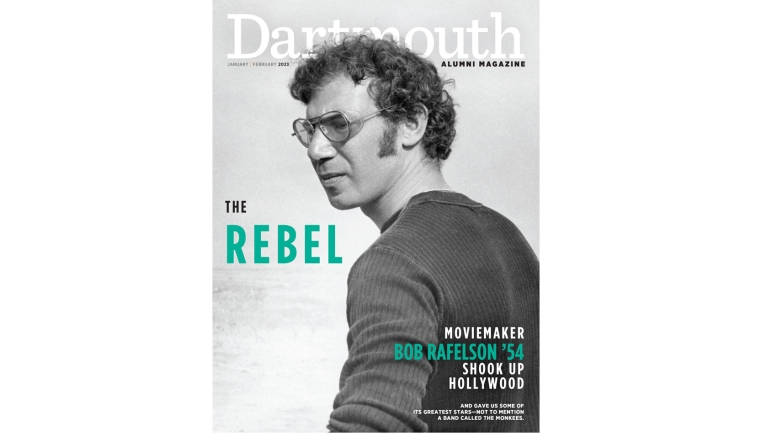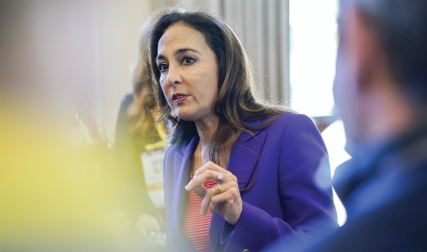Rebel Indeed
I wrote the Brubaker script and was present the night Ty Burr ’80 claims Bob Rafelson ’54 [“The Rebel,” January/February] was fired for “allegedly punching a meddlesome studio executive.” That executive, Dick Berger, was trying to save Bob’s ass. We were three days into filming (not 10, as Burr reports), and Bob was, irresponsibly, already two days behind schedule. Alan Ladd Jr., 20th Century Fox’s president, dispatched Fox V.P. Berger to our Ohio location. A production confab to steady the ship was arranged for immediately after dailies. But right after dailies Bob just started out the front door.
Dick, sitting in back, asked producer Ron Silverman to catch Bob and remind him a critical meeting had been set for “right now.” Bob snapped sarcastically and loudly: “A meeting about f***ing what?!” Dick replied just as loudly, “Tell him it’s about his f***ing career.” So Bob charged through a maze of chairs and attacked “meddlesome” Dick Berger. Dick phoned L.A., reported the assault, and Alan Ladd Jr. instructed him to fire Bob on the spot. “Tell him there will never be any violence like that on any Fox movie.”
When the axe fell, it was a disaster of Bob’s own making.
W.D. Richter ’68
Springfield, Vermont
When the axe fell, it was a disaster of Bob’s own making.
The Human Element
I became deeply incensed reading “A Wild Idea: How Conservationist Ali Fox ’02 is Making the Great Plains Great Again” [November/December 2022]. Both Ms. Fox, the director of American Prairie Reserve (AP), and the article’s author, Erik Ness ’87, seem to be living in a fantasy world. They, along with AP and its supporters, envision vast tracts of land in north central Montana being set aside so herds of bison can freely roam. What a romantic notion.
No regard, however, is given to those who have lived in the area for generations. Ranchers who make their living raising cattle do not need the added concern of competing with bison for the sparse grasses of the region.
The fact is AP is an existential threat to the cattleman and his way of life. AP is not required to follow the same rules the cattleman must when leasing federal lands. It is granted special accommodations to graze its leases longer and with no restriction on stock movement. This is not the case for the rancher. The accommodations AP receives are embraced by the organization itself. It believes it is preserving biodiversity and “sequestering carbon” (whatever all that means), thereby saving the planet singlehandedly. This achievement is much more important than a rancher making a living. The condescending and patronizing tenor of the article is difficult to accept. It is evident Ms. Fox and her organization would be more than happy to see the cowboy become extinct in order for her vision to be achieved.
HORTON “TONY” B. KOESSLER ’62
Billings, Montana
The genocide denial demonstrated by the cover article illustrates that, for all the talk in DAM about diversity at the College, we still have a long way to grow before we leave behind the racism at the core of Dartmouth’s founding myth. Fox’s project omits, as you present it to us, the humans who have been coevolving on the Great Plains with those bison of your cover for at least 14,000 years.
This leaves a reader thinking that Fox and her organization feel it is of the natural order of things that the surviving humans, whose ancestors were part of nature’s harmony, should be relegated to the Indian reservations that bookend the area—where they will be allowed to “provide additional opportunity for conservation and connection.”
All this so that the space can become a tourist destination where a diversity of successful people can recreate with nature while sitting on camp chairs drinking wine and being entertained by the prairie dogs of a real prairie dog town.
WENDELL SMITH ’64
Melrose, Massachusetts
Part of the experience of being Native American is having to deal with the erasure of our culture, history, and survival on a near daily basis. I was disappointed to be faced with another erasure experience while reading “A Wild Idea.” In explaining what caused the degradation of the Great Plains ecosystem, we are told, “In the early years of the country, settlers had plowed the prairie and removed the bison, leveling a vast grassland ecosystem in just a few decades.”
Plowed the prairie and removed the bison? Where do I begin? This historical inaccuracy needs to be challenged, not only in service of truth but in hopes that Americans might understand and, dare I say, care about how all this Great Plains land came into the possession of settlers, how it was that millions of bison were “removed” to the point of near extinction, and most importantly, to understand what a miracle it is that Native peoples of the Great Plains survived a brutal government-sponsored ethnic cleansing campaign and are today making vital contributions to the restoration and revitalization of the land, the bison, and their culture.
Here’s a wild idea: Do more reading about Native Americans.
TIANA MELQUIST ’85
Boston
Keep Debate Alive
Although I enjoy many of the articles describing the accomplishments of alumni and other Big Green stories, I must say that “Mutual Respect” [Web Extras, November/December 2022], the opinion article by Peter Slovenski ’79, is outstanding and long overdue. Having progressive thought in universities and the media is good and often encourages people to look at problems in creative ways and to consider different viewpoints. All good.
But to oppress what we now call conservative opinions is just plain dangerous. Oppression of free thought and debate is of course exactly how many totalitarian regimes gain momentum. Ironically, the woke left is claiming democracy is at stake. I completely agree, except I believe democracy is at stake due to extreme woke-ism and the lack of civil debate! This is not a minority opinion, by the way.
An article such as Peter’s is refreshing and challenging. I sincerely hope Dartmouth will consider being open-minded to both new progressive ideas and those that question those changes. Publishing Peter’s article is a huge positive step in the right direction.
GEORGE MAUER, Adv’84
Avon Lake, Ohio
I write to commend you for having the courage to publish Slovenski’s thoughtful piece. I suspect Peter and I may not agree substantively on a lot of issues. But I agree wholeheartedly with his essay.
MICHAEL JEFFREY MORRIS ’75
Shorewood, Wisconsin




